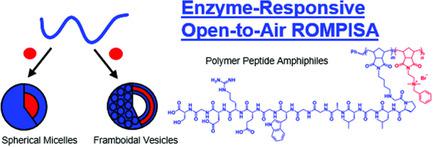当前位置:
X-MOL 学术
›
Macromol. Rapid Commun.
›
论文详情
Our official English website, www.x-mol.net, welcomes your
feedback! (Note: you will need to create a separate account there.)
Enzyme‐Responsive Polymer Nanoparticles via Ring‐Opening Metathesis Polymerization‐Induced Self‐Assembly
Macromolecular Rapid Communications ( IF 4.2 ) Pub Date : 2018-09-03 , DOI: 10.1002/marc.201800467 Daniel B. Wright 1 , Matthew P. Thompson 1 , Mollie A. Touve 1 , Andrea S. Carlini 1, 2 , Nathan C. Gianneschi 1
Macromolecular Rapid Communications ( IF 4.2 ) Pub Date : 2018-09-03 , DOI: 10.1002/marc.201800467 Daniel B. Wright 1 , Matthew P. Thompson 1 , Mollie A. Touve 1 , Andrea S. Carlini 1, 2 , Nathan C. Gianneschi 1
Affiliation

|
Open‐to‐air aqueous‐phase ring‐opening metathesis polymerization‐induced self‐assembly (ROMPISA) is reported for forming well‐defined peptide polymer nanoparticles at room temperature and with high solids concentrations (10 w/w%). For these materials, ROMPISA is shown to provide control over molecular weight with high conversion while open‐to‐air. Moreover, these peptide polymer nanoparticles can spontaneously rearrange into larger aggregate scaffolds in the presence of the proteolytic enzyme, thermolysin. This work demonstrates the robust nature of ROMPISA, highlighted here for the preparation of stimuli‐responsive nanostructures in one pot, in air.
中文翻译:

通过开环复分解聚合诱导的自组装的酶响应性聚合物纳米颗粒
据报道,露天水相开环复分解聚合诱导的自组装(ROMPISA)可在室温下以高固含量(10 w / w%)形成定义明确的肽聚合物纳米颗粒。对于这些材料,显示出ROMPISA可对分子量进行控制,并具有高转化率,同时可对空气开放。而且,这些肽聚合物纳米颗粒可以在蛋白水解酶即嗜热菌素的存在下自发地重排成更大的聚集支架。这项工作展示了ROMPISA的坚固特性,此处突出显示了在空中一锅中制备刺激响应性纳米结构的过程。
更新日期:2018-09-03
中文翻译:

通过开环复分解聚合诱导的自组装的酶响应性聚合物纳米颗粒
据报道,露天水相开环复分解聚合诱导的自组装(ROMPISA)可在室温下以高固含量(10 w / w%)形成定义明确的肽聚合物纳米颗粒。对于这些材料,显示出ROMPISA可对分子量进行控制,并具有高转化率,同时可对空气开放。而且,这些肽聚合物纳米颗粒可以在蛋白水解酶即嗜热菌素的存在下自发地重排成更大的聚集支架。这项工作展示了ROMPISA的坚固特性,此处突出显示了在空中一锅中制备刺激响应性纳米结构的过程。











































 京公网安备 11010802027423号
京公网安备 11010802027423号